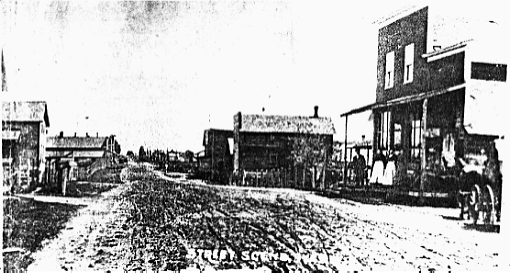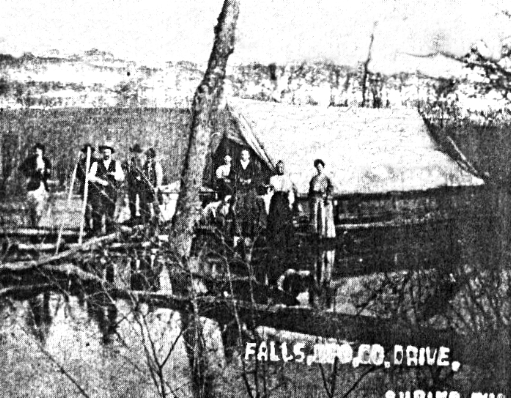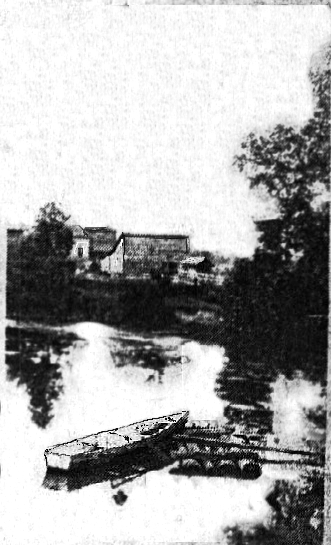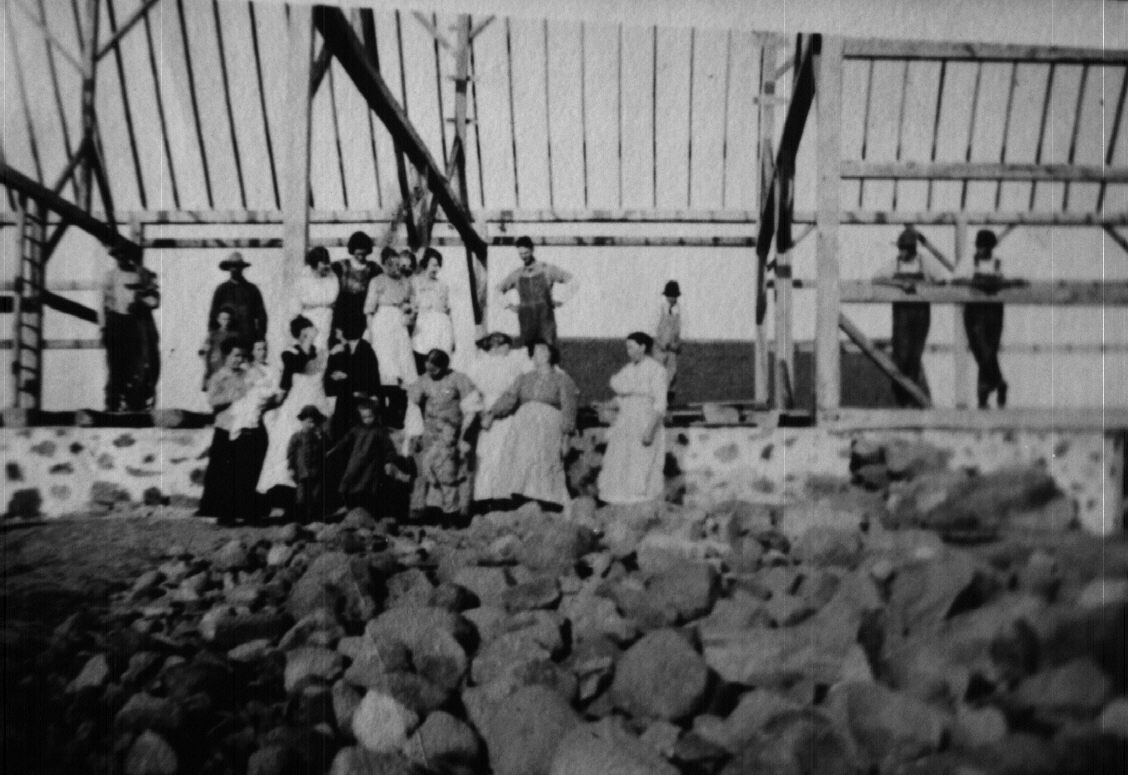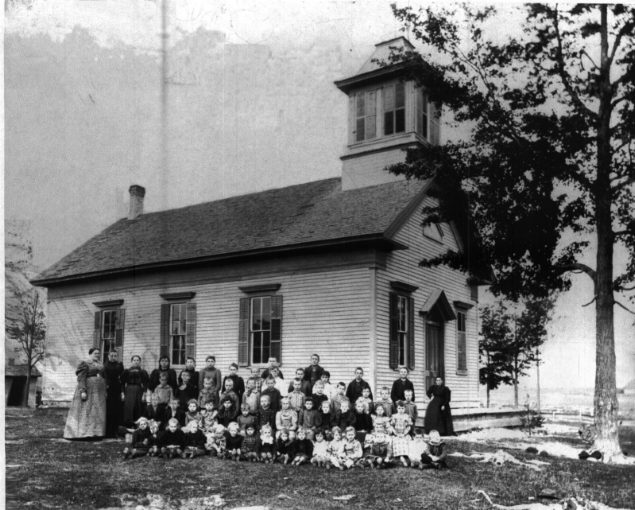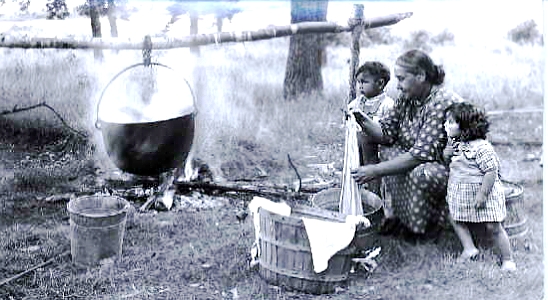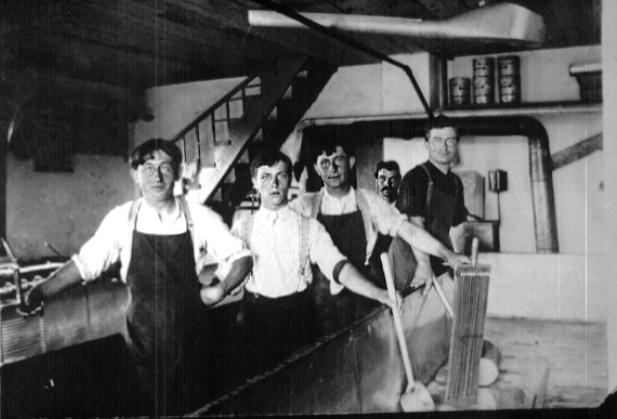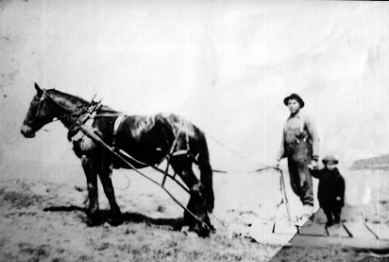| Oconto County Reporter
November 11, 1971 Written by Bruce Paulson
and posted with his permission.
Pioneer Days In How and Hayes Were Happy Times.
In the late 1860’s, Alexander Grignon came to what is now the town of How and settled there with his small family. He was assigned there as an instructor for the Menominee Indian reservation nearby. Arriving shortly after the Grignon’s was Julius Suring, who cam from Belle Plain in Shawano County. Suring operated a small store there, and in 1880 erected a sawmill on the Oconto River a short distance from the hamlet of Hayes. In 1882 he moved his family into a small home near the sawmill and founded the village of Suring. At that time, the area, which is now Suring, was a swampy wilderness. Other early settlers in the township were the families of Robert and Herman Yakel, William Bartz, Mike Ehlinger and Edward Suring. Henry Johnson, who later became treasurer of the state of Wisconsin, arrived in the town of How in 1879. While state treasurer, he wrote the following article concerning early life in the township: “What I shall write here of the pioneer days in the town of How may appeal to some people as a hardship but, to one, it is a pleasure to make a home out of what was at that time a wilderness, and it maybe an inspiration to the younger generation to start out and do something for themselves instead of having everything done for them.” “On the morning of June 16, 1879, in company with Fred
Stienke, I started on foot from Shawano for the town of How for the purpose
of looking over some land. The distance was 28 miles and we arrived at
Herman Yakel’s place at noon. At that time there was located in the town
of How ten families. In company with said Herman Yakel we looked over section
15 and concluded to buy land in that section. We started back on our trip
in the afternoon with the expectation of stopping at Mrs. Kruse’s house
four miles west of the Yakel’s.”
“During the summer of 1879, I cleared off a plot of ground, and what few neighbors there were helped me erect a log house, 16X24 feet. The next spring my wife and I moved to the town of How to take up what is supposed by many as hardship – clearing up the land – but the pleasure in doing it is such that it inspires a man from day to day, and the friendly associations that were formed among the settlers cannot be duplicated by any social center established nowadays.” “We were a busy lot, living strictly up to the eight-hour
law - eight hours in the forenoon and eight hours in the afternoon, and
sometimes a little over-time. When a new settler came in we were always
ready to help him build a house and, when he had some chopping done, we
helped him to log up so that he might be able to get in a patch of potatoes.”
“The early settlers had this advantage. There was plenty of fish in the brooks and in the lakes, plenty of deer and no game wardens. In fact, the early settlers lived a good deal like the Indians. We used what was there. In the summertime we used to make salt licks and someone would go out and kill a deer and divide it up among the settlers, or two or three would go to the Indian lakes and spear a lot of fish and the next day everybody would have fish.” We cleared up our land in the summertime and in the winter we had plenty of chance to work in the woods and earn enough money to tide us over to next summers work. We did not have the privilege of banking facilities as there are today, nor did we undertake to run in debt as people do nowadays.” “After the harvest we used to make a trip to Shawano with our grist and lay in our supplies for the winter. And such loads we used to come home with! Today that would be considered hoarding, but at that time we considered it thrift.” “The first mail route to the town of How was established by Mr. Weinhold who, once a month, would go to Oconto – a distance of 35 miles – and bring back our mail. Later we hired him to make the trip twice a month. Nowadays we must have the mail at least twice a day or we are not satisfied. “The early settlers had to blaze the way for roads,
surveying and cutting them out, digging the stumps, putting in corduroy
and bridges. The early settlers are entitled to some credit for the road
system. A man on the road was paid $1.50 per day, and $2.00 for a team.”
“I have seen the town of How improve in the way of
building. First there was a little log barn and later splendid frame barns
with all the modern improvements. And in place of the little log houses,
we now find splendid residences which could be a credit to any city, but
as the country improves, sociability disappears, and I doubt very much
the people now living in the town of How are enjoying life socially as
well as the early settlers did.”
“The little schoolhouse used to be a rendezvous not only for school purposes but for church and our political meetings. Backwoodsmen seemed to have their ideas about politics as well as the city men and, in looking over the past years in Oconto county, I remember how the farmers used to put it over the city fellows at our county conventions. Nowadays we would call that corruption. So we had our fun in that line.” “Our businessmen could hardly be called profiteers, as I know they did business for years and years and seemed to be satisfied with what is considered legitimate profit.” "I have said but little about our wives who are entitled
to as much credit in pioneer life as the men are. They had the cares, sorrows
and troubles. In sickness we had no doctors, but there was always the Good
Samaritan on hand to help out as the occasion required. There certainly
were some splendid women in the town of How. They seemed to have been sent
there just for the purpose of looking after humanity.”
“So I say to those people who look upon the hardships that we had to contend with in order to build up a home in northern Wisconsin will undertake it, they will find that there is a great deal of pleasure in making a home. I have gone through it and have seen all sides of life. I suppose there are people today who envy me the position that I hold, but let me say there is no brighter spot to me then the home that I made in the town of How, and I expect to return to it someday to mingle again with the old settlers.” In the early 1880’s, free land grants were given and a mass immigration from Germany brought Hischke, Schuettpelz, Buhrandt, Zaddock and Tuschy families to the area. The German Lutheran congregation held it’s first church service, with the aid of circuit riders, in the Herman Yakel home. In the mid-1880’s, they erected a log church that served as a house of worship until 1904 when their present structure was erected.
The Evangelical United Brethren (German Methodist) built their small church in 1885. The Hankwitz, Gerndt, Luebeck, Strehlow and Kruschke families were its founding members. Herman Hankwitz came to Hayes in 1882 and bought out Julius Suring’s store business. He also owned a sawmill on the banks of Hayes brook. His daughter, Mrs. Francis (Alla) Porter, now resides in Oconto. Mrs. Porter was a music instructor and taught many people in her day. She also was a teacher at the Hayes public school. Many tales have been handed down concerning incidents between the townspeople and the Menominee Indians from the reservation, to wit: When supplies were needed by the pioneer’s families,
the men would have to walk as far away as Shawano to get them. While the
men were gone, their women would peer out their windows at night and see
Indians watching the houses from behind trees. When the men returned and
reprimanded the Indians, they would say they were only watching over the
women and children until the men came back. There were no reports of any
harm ever being done, but it must have given the women settlers an eerie
feeling, knowing they were being watched all night by strange Indians.
Herman Hankwitz would trade with the Indians and would have to go to the Indian agency in Keshena to collect money due him. Once while coming home with a large sum of money, he realized he was being followed by a not to friendly band of Menominee’s. After rounding a bend in the road, and with the Indians temporarily out of sight, he jumped out of his buggy and sent the horses on home. He then hid in the thick forest until the next day when he felt it would be save to continue on his way. Gus Otto and Chris Weinholt had a freight line from what is now Lena over to Hayes. A passenger stagecoach also ran through Hayes from Pulcifer to a point in upper Michigan. These freight and passenger lines were mule drawn. The hill down to what is now Suring (called Plank Hill due to the split logs laid as a cordory roadbed) presented many a problem as both mules and horses would sink into the soft sand. Many of the early business people in Hayes were instrumental in the founding of Suring. The coming of the railroad to Suring brought an end to a hope that Hayes would become a large trade center of the area. Today Hayes is a quiet and peaceful little hamlet except for the fourth of July, Miss Anna Holl, a general store keeper there since 1909, had endeared herself to many in the surrounding area with her annual fireworks display and Independence Day parties. (Rita's Note: The original Holl
General Store in Hayes was build by John Holl, Anna's father, in 1896 and
run by the family until his retirement in the late 1920's, when Miss Anna
Holl became owner and propietor. In 1954 she rebuilt and moderized the
store to 4 times the size of the original and continued to serve the entire
community until declining health caused her to sell the business in 1972.
Independance Day fireworks, community picnics, and a visit by Santa to
hear the wishes of the children were begun by John and his wife Veronica
Kurz Holl in the early 1900's. Anna Holl continued to sponsor these events
throughout her years of ownership. Penny candy, ice cream, and goods wrapped
in brown paper and string are also among the childhood memories of many
area residents, thanks to the family who saw everyone as friends).
The store was destroyed by fire almost 30 years ago, and nearly every building
is gone, leaving only a few memories in this ghost town of Hayes.
|
